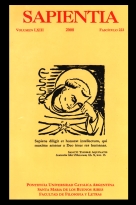Por favor, use este identificador para citar o enlazar este ítem:
https://repositorio.uca.edu.ar/handle/123456789/4728| Título: | Le relativisme idéologique | Autor: | Mahé, Michel | Palabras clave: | RELATIVISMO; LIBERTAD; EXISTENCIA; ESENCIA; VERDAD; VERBO | Fecha de publicación: | 2008 | Editorial: | Pontificia Universidad Católica Argentina. Facultad de Filosofía y Letras | Cita: | Mahé, M. Le relativisme idéologique [en línea]. Sapientia. 2008, 63 (223). Disponible en: https://repositorio.uca.edu.ar/handle/123456789/4728 | Resumen: | Abstract: From a general standpoint, current thought is dominated by an ideological relativism which considers that truth depends on whom asserts a certain statement. This stance, related to Protagoras’ perspective, rejects the Enlightenment’s view, especially Kant’s way of thinking, viz. It rejects of all forms of authority, transcendent authority in particular. It also favors the conception of the subject developed by Sartre’s existentialism. However, relativism is the ultimate expression of skepticism which always reflects a painful rational relinquishment of the natural desire for truth. Relativism weakens reason and makes the arrival of ideological and political totalitarianism possible, which the 20th century suffered in its most tragic versions. In order to prevent its consequences and to restore reason’s legitimate confidence in wisdom, modern man ought to find the universal within him and his natural thirst for truth, and his transcendent origin. This demands recognizing and accepting humbly man’s condition as a creature, and his dependence on the Verb, who is Truth and Life. Résumé: La pensée actuelle est, globalement, dominée par un relativisme idéologique, qui considère qu’une proposition possède la vérité que lui accorde son émetteur. Cette attitude, qui rappelle celle de Protagoras, poursuit le rejet des Lumières, notamment Kant, de toute autorité, surtout transcendante, qui entendrait s’imposer à la raison; et la conception du sujet développée par l’existentialisme de Sartre. Mais le relativisme devient l'ultime manifestation du scepticisme qui exprime toujours un douloureux renoncement rationnel au désir naturel de vérité. Ce relativisme affaiblit la raison, et rend possible l’avènement du totalitarisme idéologique et politique, dont le XXème siècle a subi les développements dramatiques. Pour éviter cette dérive, et pour restaurer la raison dans une légitime confiance en ses capacités à la sagesse, l’homme moderne doit retrouver le sens de l’universalité de sa nature, de son lien vital à la vérité, et de l’origine transcendante de celle-ci. Ceci exige que l’homme moderne reconnaisse et accepte son humble condition de créature, et sa dépendance au Verbe, qui est Vérité et Vie. |
URI: | https://repositorio.uca.edu.ar/handle/123456789/4728 | ISSN: | 0036-4703 | Disciplina: | FILOSOFIA | Derechos: | Acceso Abierto | Fuente: | Versión original impresa en Sistema de Bibliotecas UCA: Sapientia Vol. LXIII, Nº 223, 2008. |
| Aparece en las colecciones: | SAP - 2008 Vol LXIII nro. 223 |
Ficheros en este ítem:
| Fichero | Descripción | Tamaño | Formato | |
|---|---|---|---|---|
| relativisme-ideologique-michel-mahe.pdf | 193,96 kB | Adobe PDF |  Visualizar/Abrir |
Visualizaciones de página(s)
156
comprobado en 27-abr-2024
Descarga(s)
617
comprobado en 27-abr-2024
Google ScholarTM
Ver en Google Scholar
Este ítem está sujeto a una Licencia Creative Commons

